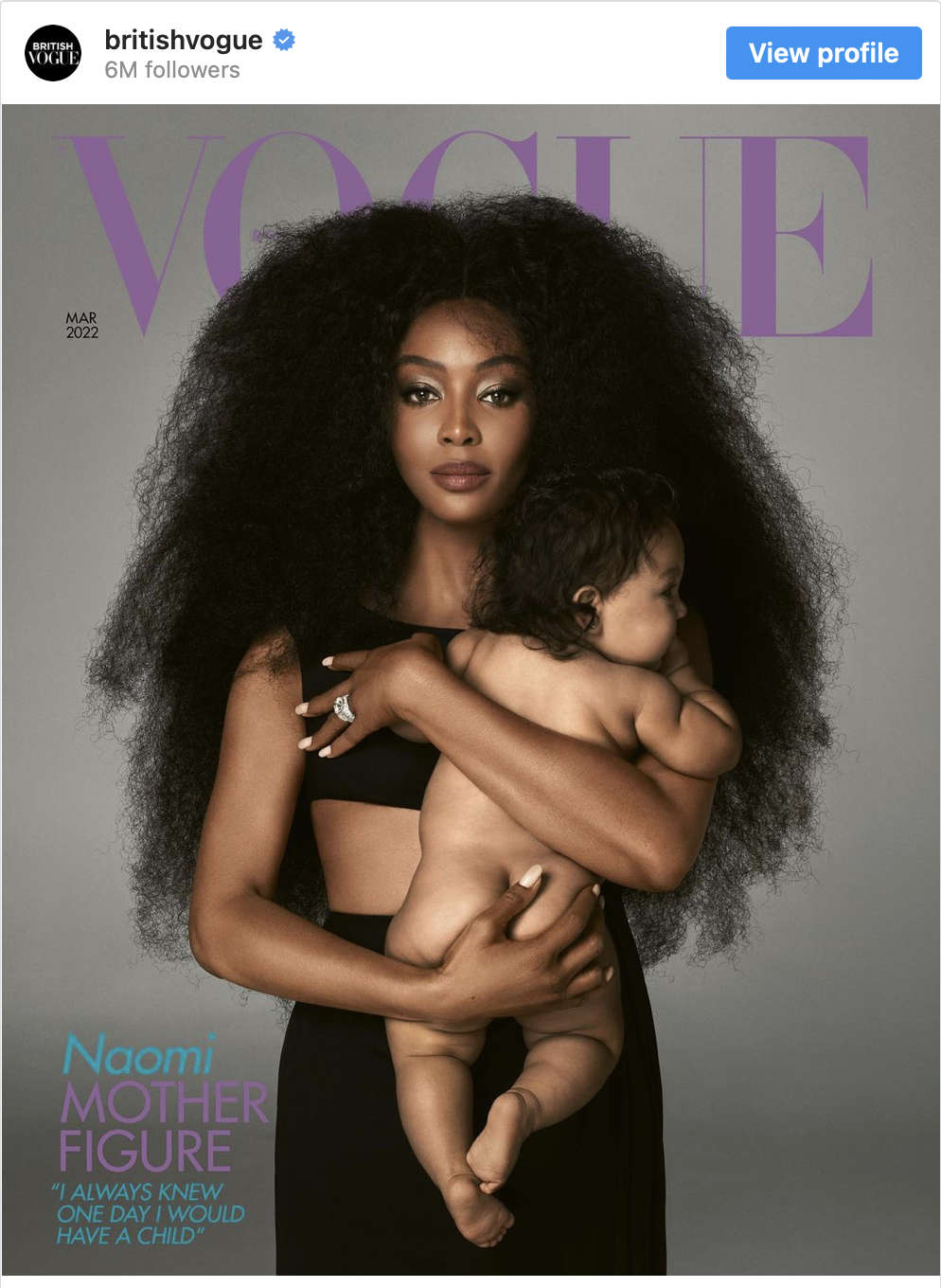
New figures show more women over 40 are becoming mums – and Naomi Campbell has joined them. Experts outline the pros and cons of delaying parenthood.
Mums are getting older. The latest official figures reveal 142% more women over 40 and 500% more over-45s are having children than the previous generation – and supermodel Naomi Campbell is part of that growing band.
Campbell, 51, recently posed for a photoshoot with her first child, and though it is not known whether a surrogate carried her now-nine-month-old baby girl or not, she told Vogue: “She wasn’t adopted – she’s my child.”
It’s clear Campbell is not alone in wanting to become a mother later in life. For women born in 1975, six in every thousand aged 45 and over successfully gave birth, a 500% increase over the previous generation, when just one woman aged 45 and over in every 1,000 gave birth.


In addition, research by London Medical Laboratory has found the number of first-time births among women aged 40 to 44 more than doubled in the 32 years from 1990.
Figures from the National Office of Statistics including births up to 2020 show increasing numbers of women are having babies in later life – 29 in every 1,000 40-year-olds (born in 1979) gave birth, compared to just 12 in every 1,000 in their parents’ generation – a 142% increase.
“Becoming a mum in your late thirties and forties can be immensely positive,” says Elizabeth Duff, senior policy adviser at the parents’ charity NCT. “Women are living longer, attitudes to later motherhood are changing, and feeling ready to have a baby can be a major part of the decision and the ability to enjoy parenthood.”
Duff acknowledges there are statistically more risks of complications during pregnancy and childbirth for older first-time mums, but she stresses: “For individual women who are fit and healthy, there’s no reason not to plan for a straightforward birth.”
And Dr Quinton Fivelman, chief scientific officer at London Medical Laboratory, which carries out fertility hormone blood tests, adds: “Twenty years ago, conceiving over 35 was called a ‘geriatric pregnancy’. Given the fact women were planning to have children, not move into a nursing home, this kind of terminology was symptomatic of negative preconceptions surrounding older mothers.

“Today, the term is no longer used, at least on the NHS website. With a change in terminology to ‘advanced maternal age’ has also come a change in attitudes, as childbirth in women’s late thirties and forties becomes increasingly routine.”
Fivelman says that while postponing childbirth until later in life isn’t without risks, they can be mitigated by regular check-ups and tests. “As careers and lifestyle choices have evolved, women have altered their goals,” he says, “and as the increasing number of successful over-40 births shows, it’s perfectly possible for most healthy women in their thirties and forties to have healthy babies.”
Clearly, having children later in life has both advantages and disadvantages. Here’s what potential mothers-to-be might want to consider…
Risks
Harder to conceive
Fertility decreases with age, particularly after the age of 35 because a woman’s number and quality of eggs decreases, says the baby charity Tommy’s. One study found nearly a fifth of women aged between 35 to 44 struggle to conceive, compared to less than one in 10 women who had a child before the age of 25.
Higher miscarriage risk

The risk of miscarriage increases with age – one study found the risk of miscarriage was 10% in women aged 25-29, and rose rapidly after the age of 30, reaching 53% in women aged 45 and over.
Higher risk of chromosomal abnormalities
Older eggs increase the odds of chromosomal abnormalities. However, Fivelman says: “Modern testing methods are very successful at detecting the majority of these at an early stage (11-14 weeks).”
Higher preeclampsia and diabetes risk
Another risk for older mothers is high blood pressure, which may increase the risk of the pregnancy complication preeclampsia, and there’s also a higher risk of gestational diabetes. Blood tests and regular antenatal checks help monitor these issues, and Duff stresses: “Clinical back-up from health services can help ensure that births are safe and well cared-for if complications arise.”
More caesareans
Studies show older mothers are at significantly higher risk of having a caesarean birth, and while Fivelman says regular check-ups help reduce the risks of premature birth and low birth weight that are more common for the babies of older women, “it’s also likely older mums will have a managed c-section delivery to reduce the risks of problems such as preeclampsia.”
Harder pregnancy

Simply being pregnant can also be harder for older mums-to-be, Fivelman points out. “That’s because we all start to lose bone density at around the age of 40, so there may be increased aches and pains compared to younger women.”
Older men present risks too
If the baby’s father is a similar age or older, this may also present some pregnancy risks. Men over 40 start to have a lower sperm count and the sperm may have less mobility. “The older a man is, the longer it will take his partner to get pregnant and the greater her risk of miscarriage, regardless of her age,” warns Fivelman.
Benefits
More time for bonding
Women successfully established in their careers before childbirth may have more time to spend with their children, which is mutually beneficial, Fivelman points out.
Health gains
Research has found women who have children later also tend to have a longer life span, and a recent study found they also have decreased cognitive impairment in later life, compared to those who had kids earlier or who never had children.
Women may be in a better life position
Older women and their partners are more likely to be in a better financial situation, and may be in a more stable relationship than when they were younger. Research has found older mums worry less during pregnancy, are more positive about becoming parents, and generally have a more positive attitude towards their children.
Children benefit too
Being the child of an older mum also has its advantages. The same study that found older mums are more positive also showed their children have fewer social, emotional and behavioural problems when they start school, and perform better throughout their education, achieving higher exam scores and graduation rates.


 Five Of The Most Wondrous Ancient Ruins In The World
Five Of The Most Wondrous Ancient Ruins In The World
 Five Of The Most Inhospitable Places on the Planet
Five Of The Most Inhospitable Places on the Planet
 Five Animals You Wouldn’t Believe Are Kept as Pets
Five Animals You Wouldn’t Believe Are Kept as Pets
 Five Most Pet-Friendly Destinations in the UK
Five Most Pet-Friendly Destinations in the UK
 Five UK Valentine's Destinations Perfect For A Night Away
Five UK Valentine's Destinations Perfect For A Night Away



 More Than 70 Driving Offences Dealt With Over Two Days On Isle Of Wight Roads
More Than 70 Driving Offences Dealt With Over Two Days On Isle Of Wight Roads
 Wightlink Technical Problems Lead To Cancellation Of All Fishbourne-Portsmouth Crossings
Wightlink Technical Problems Lead To Cancellation Of All Fishbourne-Portsmouth Crossings
 Contentious Plans For New 7,245 Square Metre Commercial Park Appealed
Contentious Plans For New 7,245 Square Metre Commercial Park Appealed
 Wightlink Crossings Cancelled Due To Engine Issues
Wightlink Crossings Cancelled Due To Engine Issues